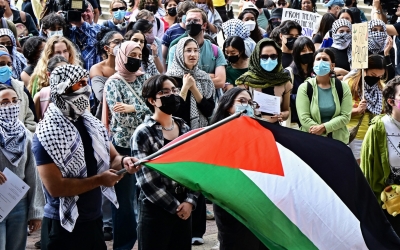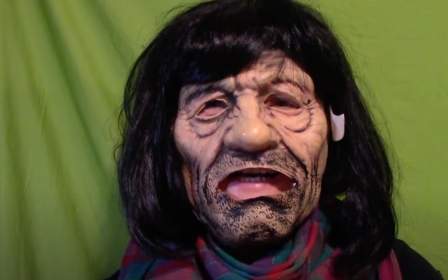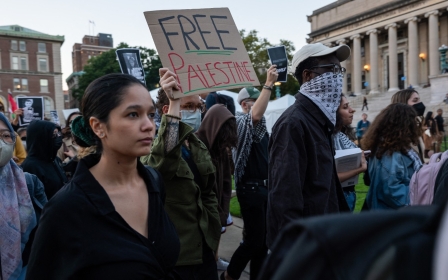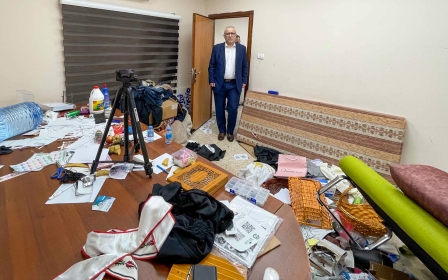Israel-Palestine war fuelling Islamophobic attacks at University of Cambridge
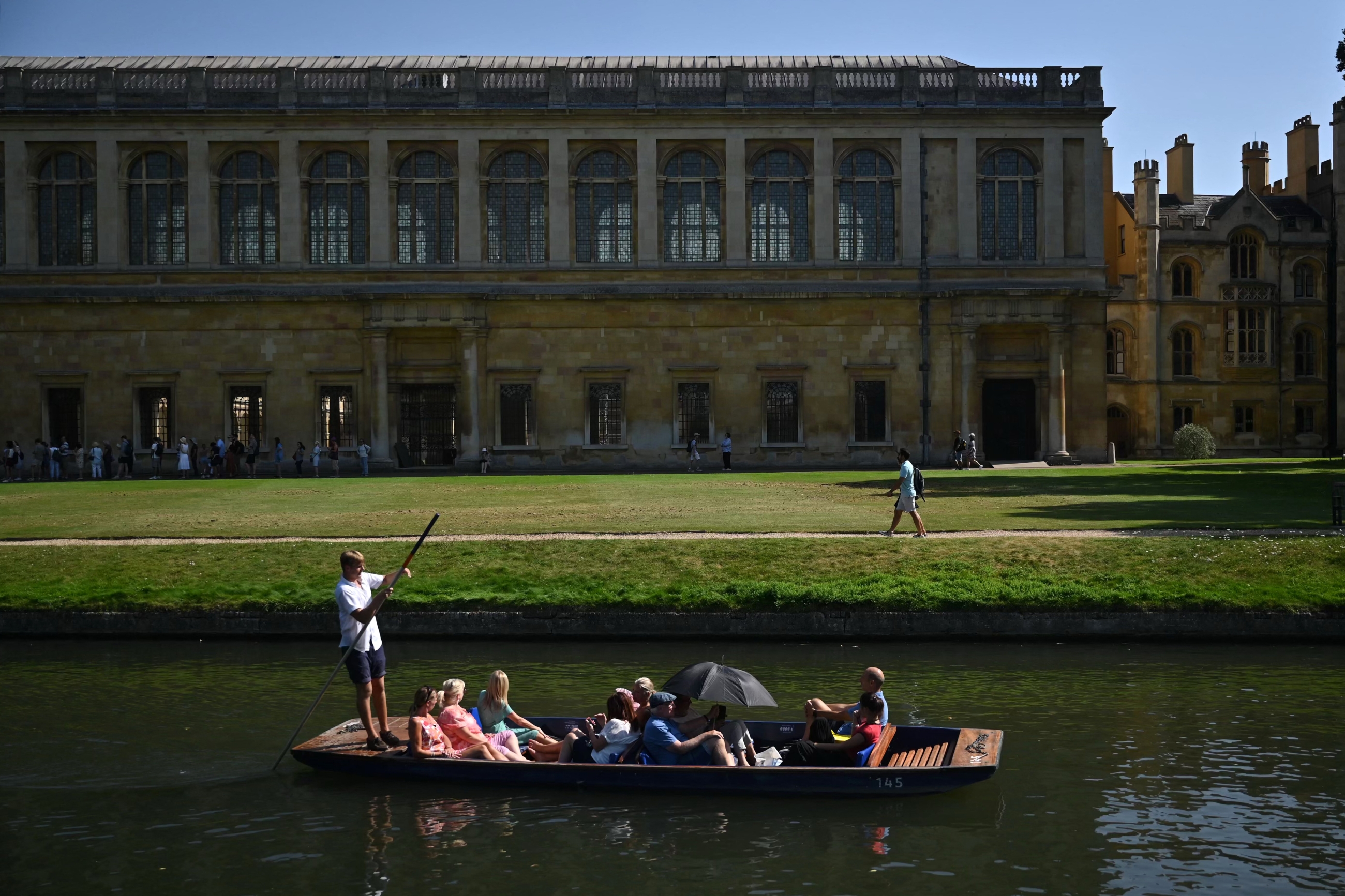
The number of Islamophobic incidents at the University of Cambridge has risen since the onset of war between Israel and Palestinian groups, with students warning of a "climate of censorship" where pro-Palestine solidarity is repeatedly muzzled.
The University of Cambridge Islamic Society released a statement on Tuesday encouraging Muslim students to "remain cautious [and] travel in groups where possible" after reports of "multiple incidents of religiously motivated attacks and Islamophobic hate crimes".
Students told Middle East Eye that there has been a string of attacks against Muslim students since the start of the latest conflict, with some of the victims wearing clothes that clearly identified them as Muslim.
According to the students, two of the incidents involved the perpetrators referencing the Palestinian group Hamas.
MEE understands that several of the University of Cambridge's constituent colleges have been in contact with students about the rise in attacks. Corpus Christi College sent an email to students about the situation on Friday.
New MEE newsletter: Jerusalem Dispatch
Sign up to get the latest insights and analysis on Israel-Palestine, alongside Turkey Unpacked and other MEE newsletters
The email, seen by MEE, said: "A significant number of hate crimes against Muslim students have been reported to the police in Cambridge over the last few days.
"These include verbal and physical assault both on university grounds and around the city."
Islamophobic hate crimes and antisemitism have been on the rise in recent weeks, most notably in London, with the Metropolitan Police saying Islamophobic offences have increased by more than 140 percent.
The force also reports that antisemitic hate crime has soared in London, with 408 offences recorded so far this month compared to 28 in the same period last year.
Several Muslim students told MEE on condition of anonymity that the conflict had led to an intimidating atmosphere on campus, with many fearing administrative repercussions when speaking up about the situation in Gaza.
Follow Middle East Eye's live coverage for the latest on the Israel-Palestine war
They said the situation was heightened when faculty members, most notably James Orr, a professor in the Faculty of Divinity, posted content on social media that many perceived as racist and Islamophobic.
"Import the Arab World, become the Arab World," Orr wrote on the social media platform X, formerly known as Twitter.
MEE reached out to the university for comment but did not receive a response by the time of publication.
The Palestine Solidarity Society (PSS) and the Middle Eastern North African Society slammed Orr's remarks, calling them "obviously racist".
A fellow faculty member, speaking anonymously to the student newspaper Varsity, said it was "unthinkable that Orr can continue to enjoy the confidence of students and colleagues to teach, examine and collaborate without discrimination".
Students told MEE such statements would likely go unpunished. An organising member of the University of Cambridge's student-run PSS said there was a "climate of censorship and intimidation of Palestinian and pro-Palestinian students".
Doxxing and trolling
Several other Muslim students also described feeling afraid to voice their opinions on the conflict, whether on campus or online.
One student, speaking on condition of anonymity, said that their social media posts had been flagged to the centre they were studying at in an attempt to get them suspended.
The student said that they were told by the centre's director not to bring their "views into the classroom" at such a "politically sensitive time".
"It was stifling and jarring to be told I couldn't bring my views on an issue both timely and relevant to my academic work," the student told MEE.
In another incident related to social media, the Cambridge Student Union's welfare officer Harvey Brown publicly apologised after the Telegraph newspaper published a story revealing he had liked two posts on X that appeared to celebrate Palestinians storming southern Israel on 7 October.
In his apology, Brown said that he "reacted instinctively to early images of Palestinians escaping Gaza without fully thinking through the language in these tweets" and that "I absolutely condemn all violence against civilians".
In the weeks following the 7 October attack, several student societies have also been mired in controversy.
On 16 October, the student-run Politics Society at the University of Cambridge's Queen’s College cancelled an event with political cartoonist Steve Bell after he was sacked by the Guardian for drawing a cartoon of Israeli Prime Minister Benjamin Netanyahu cutting an outline of Gaza into his stomach.
Bell, who had worked at the Guardian for 40 years, has denied that the cartoon was antisemitic.
'Complicit in Israeli violence'
Last week, chaos erupted at a student union event when a student proposed that the union should endorse a "mass uprising" in the Middle East.
The motion blamed the ongoing war on "decades of violent oppression of the Palestinian people by the Israeli state".
Motions are proposed by student union members and voted on at meetings to potentially become resolutions.
After the incident, the Jewish Society called on the university to investigate the student union, saying that "Jewish students in Cambridge deserve to learn in a safe and inclusive environment, without the murders of their relatives and friends being debated".
'The university retains ties with BAE Systems, Caterpillar, and all arms manufacturers complicit in Israeli violence'
- Palestine Solidarity Society member
The outcry also came as the university faced pressure from more than 100 students and staff demanding that it condemn Hamas.
Vice-Chancellor Deborah Prentice has maintained that the university has "zero tolerance for all forms of racism, and that includes antisemitism, Islamophobia and any other form of unlawful discrimination or abuse based on ethno-religious identity.
"At the same time, we're fully cognisant of the fact that across our community people hold very strong and divergent views about the Israel-Palestine conflict. We must affirm everyone's rights to hold and express their views within the law while continuing to care for and empathise with each other as human beings."
Since then, the PSS has repeatedly criticised the university for its perceived pro-Israel bias, and called on all constituent colleges to sever financial ties with the Israeli government, as they did with Russia following the invasion of Ukraine.
The University of Cambridge has research partnerships with multiple companies, including BAE Systems, which have provided military technology to Israel.
"The university retains ties with BAE Systems, Caterpillar, and all arms manufacturers complicit in Israeli violence," an organising member of the PSS told MEE.
"[As long as this remains the case] no Palestinian student at this university will take seriously the university's offers of welfare support," they added.
Middle East Eye delivers independent and unrivalled coverage and analysis of the Middle East, North Africa and beyond. To learn more about republishing this content and the associated fees, please fill out this form. More about MEE can be found here.


